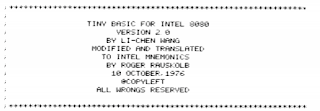"@COPYLEFT ALL WRONGS RESERVED" *
* Tiny BASIC's distribution notice, June 1976 (1)
It's a second post about licenses and rights and the second post started from a bit of history: the old pirate song, the old distribution notice...
It was a new word for me - "copyleft" and it was very interesting first to dig out it's history. It was born as a joke, controversy to "copyright, all rights reserved" in early 1976, before the concept itself.
Well, that's all, that was interesting for me. I am aside of this wordings of law and I don't like to swim in this poll. When I was younger, I thought that there are bad things and good things in the world, but in fact there is nothing purely good or purely bad, only gradations...
So the concept of copyleft was developed as a good thing to give the right to people to use freedoms of use, study, copy, modify and share with others, but under the same terms, license as the original. So the freeware should stay free, even if you modified and the source code will be always available to everyone (like Android source code as example).
But as I mentioned, the same can be good for all and as result, the copyleft got several forks:
Strong Copyleft (i.e. GNU) - the copyleft as it had to be. The software under this license is Free as Freedom.(2)
It has best advantages to users and enthusiasts, fully transparent and free to use, modify and distribute.
It has best advantages to users and enthusiasts, fully transparent and free to use, modify and distribute.
And has a lot of disadvantages to modders, developers, who thinks that their upgrade deserves more than free distribution.
The example of strong copyleft software is Linux Kernel
Weak Copyleft (i.e. Mozilla Public License) - doesn't require same licensing for mods and software, which uses not only the source code or libraries under "copyleft" license, but the software must be linked to the source.
Guess the examples of such software? Firefox and Thunderbird.
Partial Copyleft - allows you to use other license for parts of your product, which not covered by copyleft software already.
Share-Alike (i.e. Creative Commons Attribution-ShareAlike license) - protects the requirement to the software, that the original must be available exactly on the same terms as it is, even in derived software. (3)
So, as fact, the copyleft helps to protect free soft distribution, but not always a synonym for "free as freedom". Sometimes you have to pay for the source code, which you can freely modify and distribute, by buying for the complete software package. I.e. Red Hat Enterprise Linux. You can read more about here.


Comments
Post a Comment